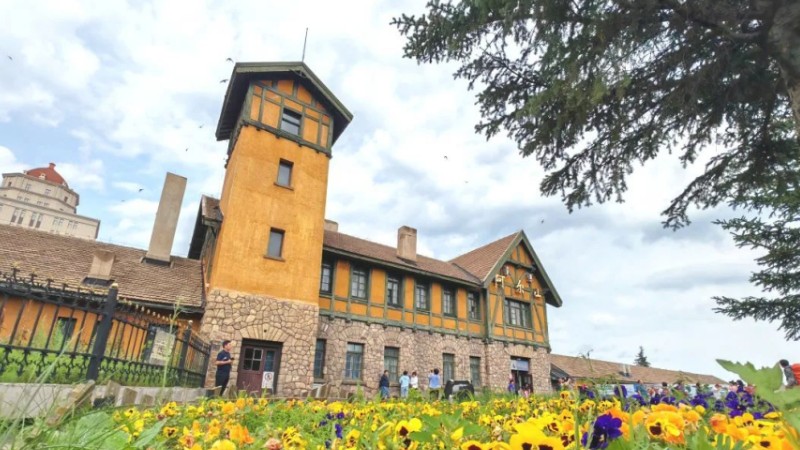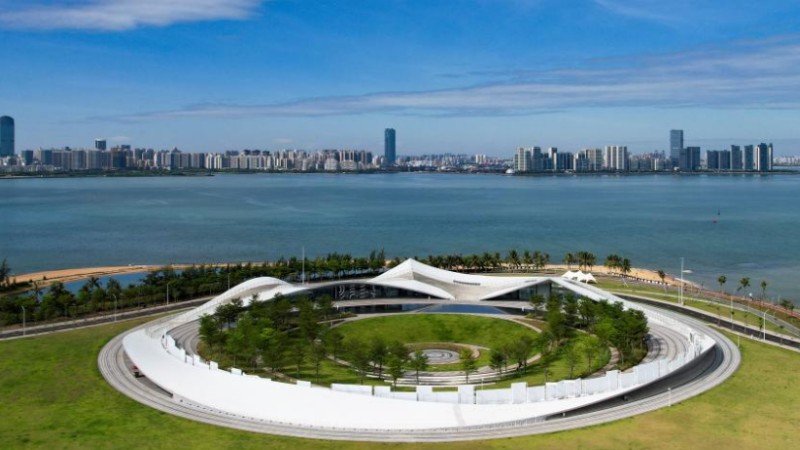Former Ethiopian president asserts Ethiopia's commitment to ensuring Belt and Road's success

Former Ethiopian President Mulatu Teshome receives an exclusive interview with People's Daily Online, Addis Ababa, Ethiopia. (People's Daily Online/Liu Ning)
In Addis Ababa, August is a damp and humid month. Raindrops rhythmically patter on the gleaming dome of the African Union Conference Centre, one of the most magnificent structures in Ethiopia's capital. A train forges through the pouring rain along the Addis Ababa-Djibouti railway into the city's train station, which has transformed into a sea of colorful umbrellas. Both projects, constructed with China’s assistance, are visible reminders of the close relationship between China and Ethiopia.
Since the establishment of diplomatic ties between China and Ethiopia on Nov. 24, 1970, the two countries have cultivated a strong relationship. This bond has since evolved into a comprehensive strategic cooperative partnership, serving as a prime example of China-Africa relations.
Former Ethiopian President Mulatu Teshome, who studied in China and is an expert in Chinese language and culture, spoke with People's Daily Online in an exclusive interview to shed light on the decades-long friendship between Ethiopia and China.
Along the prosperous Belt and Road
Since the Belt and Road Initiative (BRI) was initiated in 2013, Ethiopia has actively participated in the program, deepening cooperation with China within the BRI framework. The two countries signed a memorandum of understanding in 2018 to jointly construct the Belt and Road for prosperity and mutual benefits.
"From its very name, the Belt and Road is about having infrastructure in place to connect countries – connect China to Africa, to Ethiopia. It gives very important emphasis to the development of infrastructure, which Ethiopia is a beneficiary of," Teshome told People's Daily Online.
Teshome lauded the Chinese-built Addis Ababa-Djibouti Railway, stating that Ethiopia welcomes further infrastructure development to facilitate the easy movement of products and services between China and Ethiopia.
According to Teshome, the Belt and Road is very important. When considering the countries it encompasses, Africa can benefit greatly from the BRI, which spans across Asia, Europe, the Middle East, Eurasia. These regions can be connected via various modes – railways, roads, or sea routes. "Ethiopia is dedicated to make this initiative a success story," said Teshome.
Chinese investment in Ethiopia, especially in the manufacturing sector, will be a primary focus, according to Teshome. He also emphasized the promising future of bilateral ties between the two countries. China and Ethiopia have begun collaborating on industrial parks and industrial zones in several Ethiopian cities, and this trend is set to continue.
"It is not something which starts this year and ends next year. It is going to be long, long-term cooperation. From this long-term cooperation, both Ethiopia and China can benefit. And if we have this strong cooperation, strong economic interaction, then it will be the foundation for the political, diplomatic, cultural and other aspects of the relationship between our two countries," said the former president.
An old friend of the Chinese people
China is a "second home" for Teshome. After graduating from high school in 1976, he arrived in China to study Chinese under a program sponsored by the Ethiopian government. He started at the Beijing Language Institute, now known as Beijing Language and Culture University, and then went to the Department of Philosophy at Peking University, where he obtained a bachelor's degree. Later, he continued his studies in international politics at Peking University, earning both master's and doctoral degrees.
"I love both these learning institutions because it was the Beijing Language Institute which gave me the opportunity to open the door for my Chinese language and entrance to Chinese universities, especially Peking University. And Peking University also is a university which really shaped me, I would say, which changed my world outlook, and which brought me to the level where I am and where I was. So, I love my stay in China as a student," he said.
The overarching theme that deeply resonated with Teshome during his decade-long stay in China was "development."
"I witnessed all the developments, especially from the opening-up, up to my time as a student and also when I went back as ambassador. It was a different Beijing, and it was a different China," said Teshome.
Teshome attributes China's impressive economic advancement to the Chinese government's effective policies. However, to him, what truly stands out is their people-oriented approach. Not only has the government focused on boosting the economy, but they've also prioritized enhancing Chinese living standards. "That, I think, is the most successful part of China's reform and opening-up," he added.
Building a multipolar world
According to Teshome, developing nations don't have a say in establishing the current rules and norms of global governance. They are formulated and adopted by the major powers, especially Western countries. The international community should reevaluate the economic share and political attitudes to ensure fairness to all nations, regardless of size.
He expressed his belief that to navigate the challenges unseen in a century, developing nations should work together to create a multipolar world. He spoke highly of the BRICS, adding that an increasing number of countries are expressing their willingness to join the organization.
"In that reformation of the global standard, countries may seek to protect their interests and national interests. It is to get out of the challenges of being dominated by some few. [Developing nations] should seek a common agenda for themselves in the interest of their respective national interests," he added.
Photos
Related Stories
- Chinese company inks accord to co-develop special economic zone in Ethiopia
- Feature: Chinese doctors bring Ethiopian patients cure, hope
- Chinese doctors provide free medical services in Ethiopia
- Feature: China-sponsored training program empowers young drivers in Ethiopia
- Ethiopian scholar highlights deepening China-Africa ties in new book
Copyright © 2023 People's Daily Online. All Rights Reserved.









